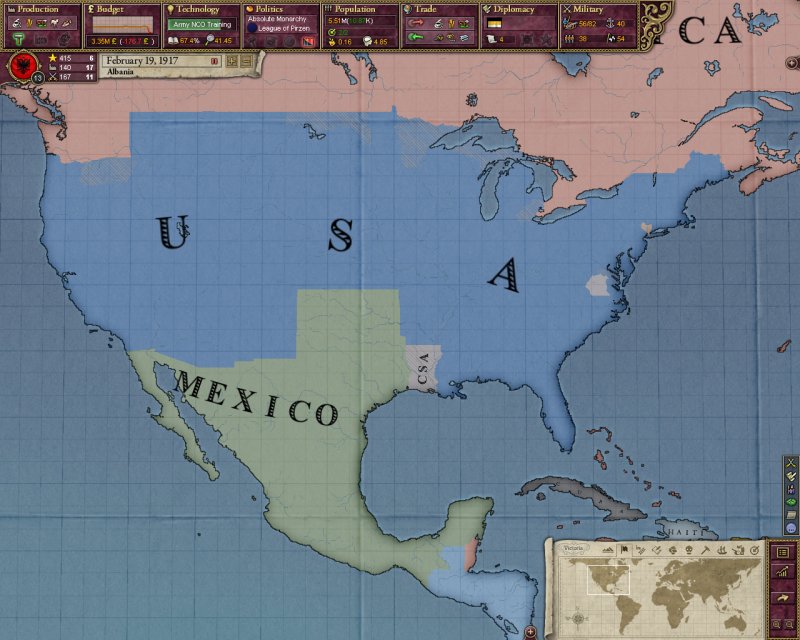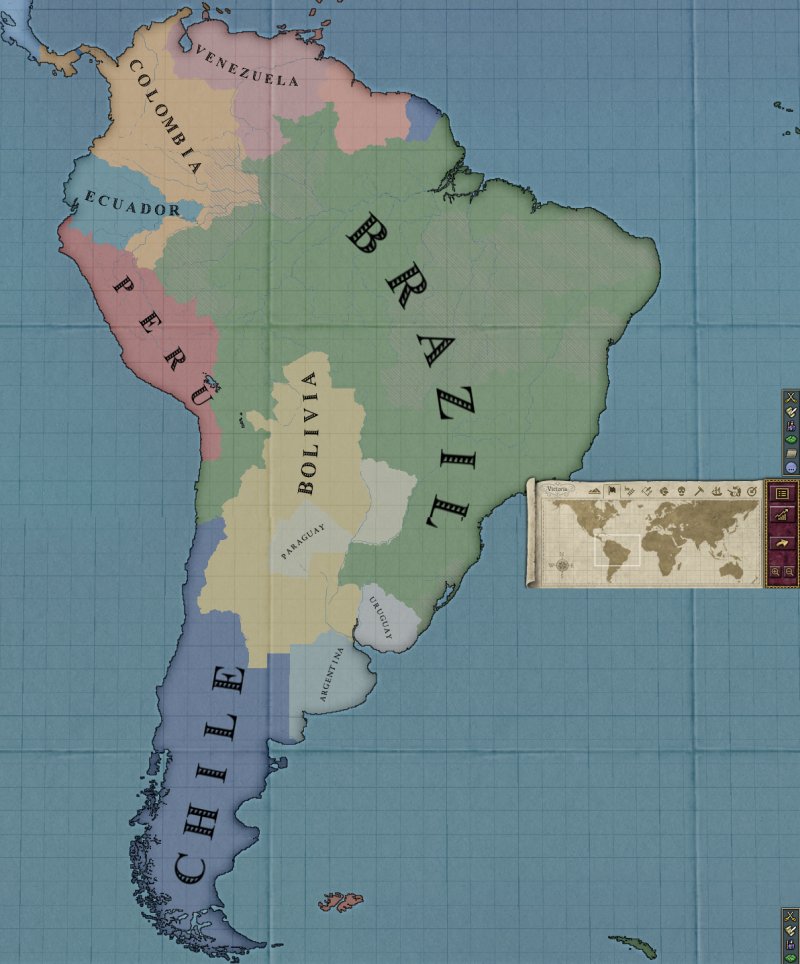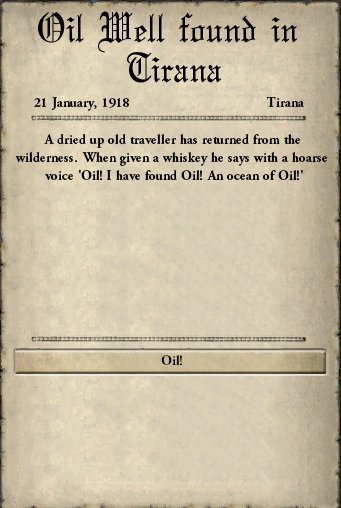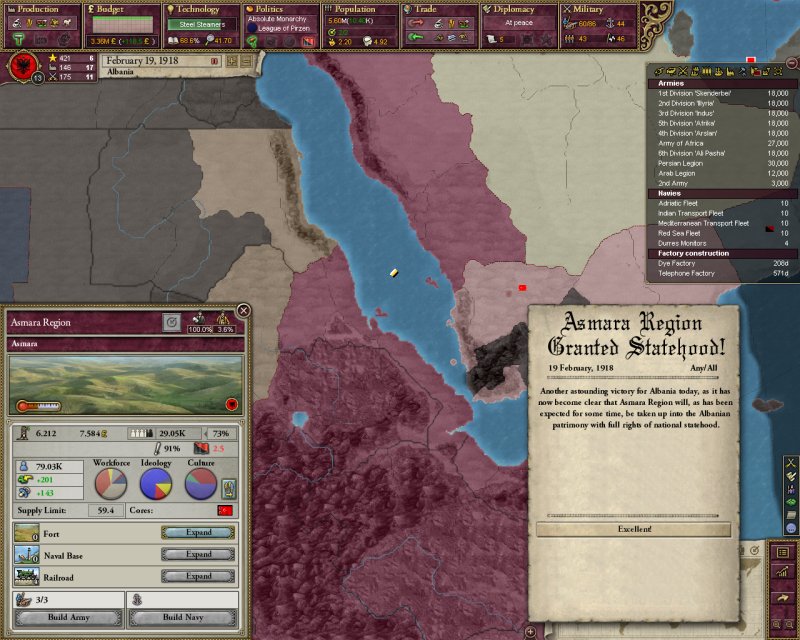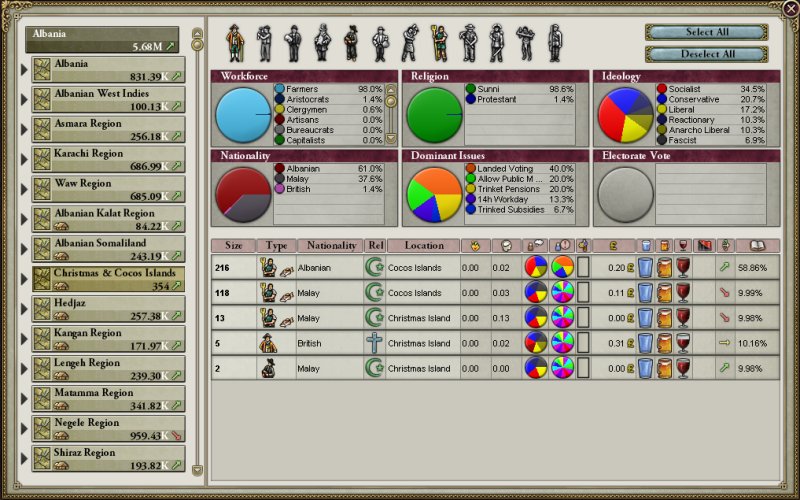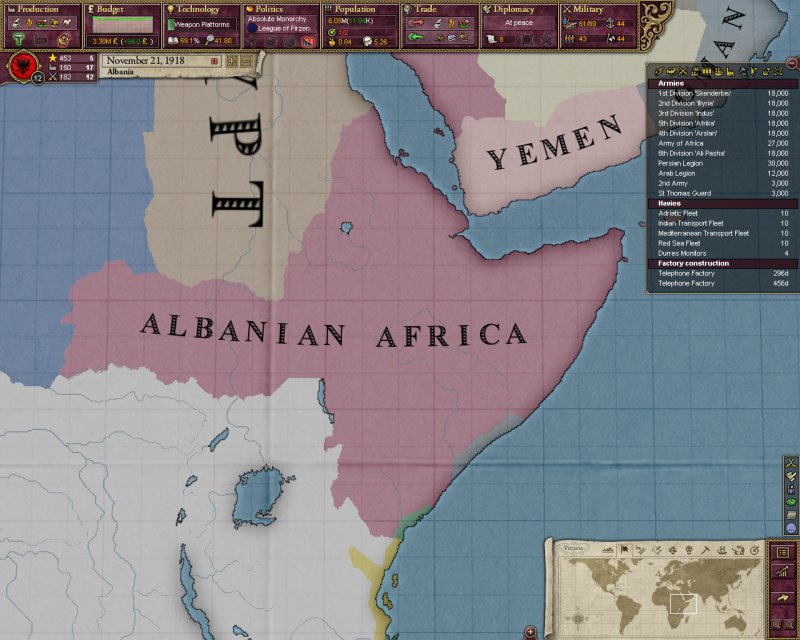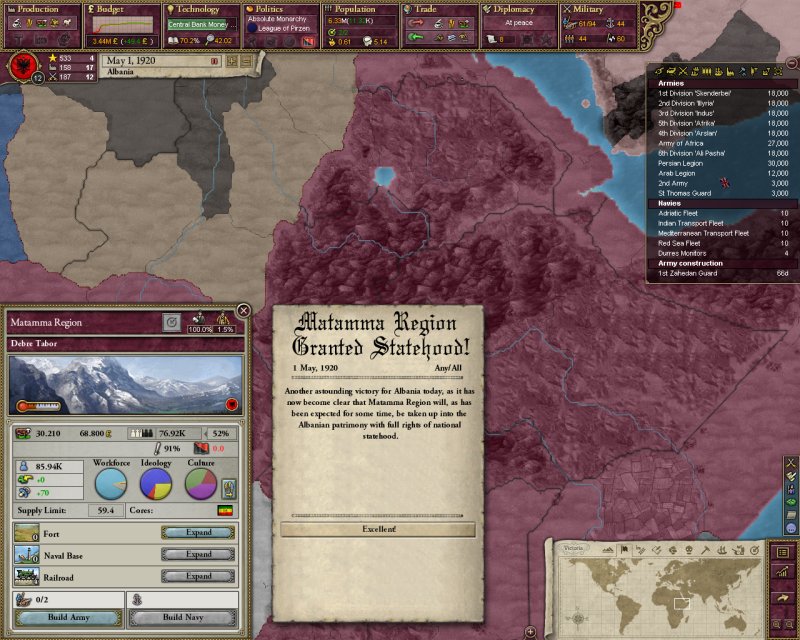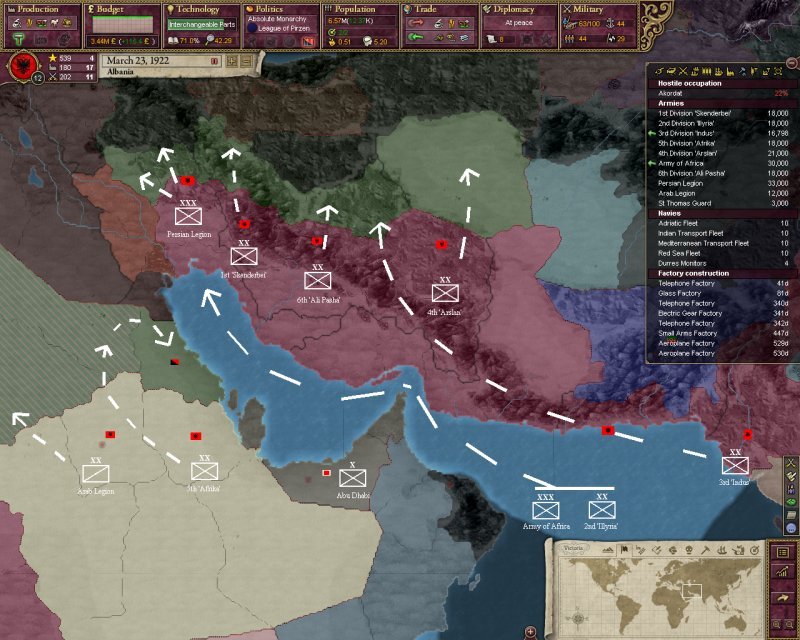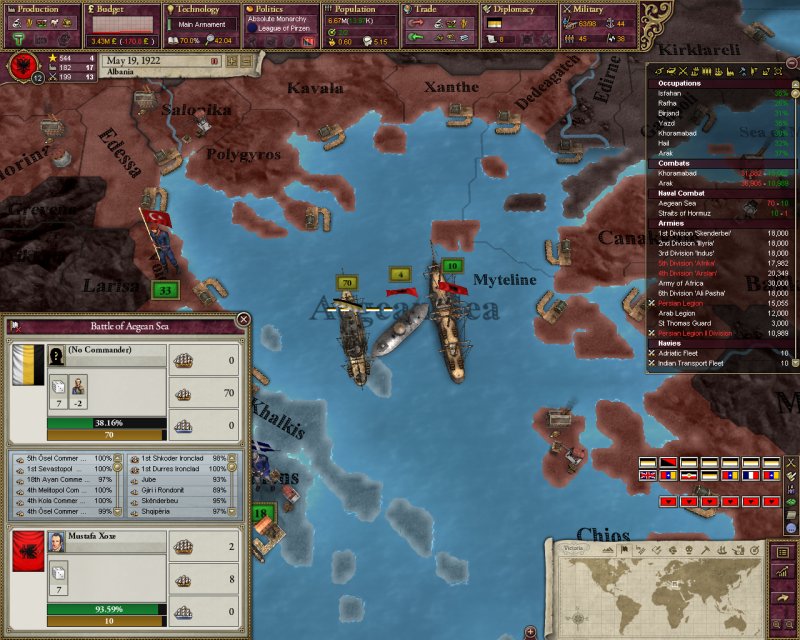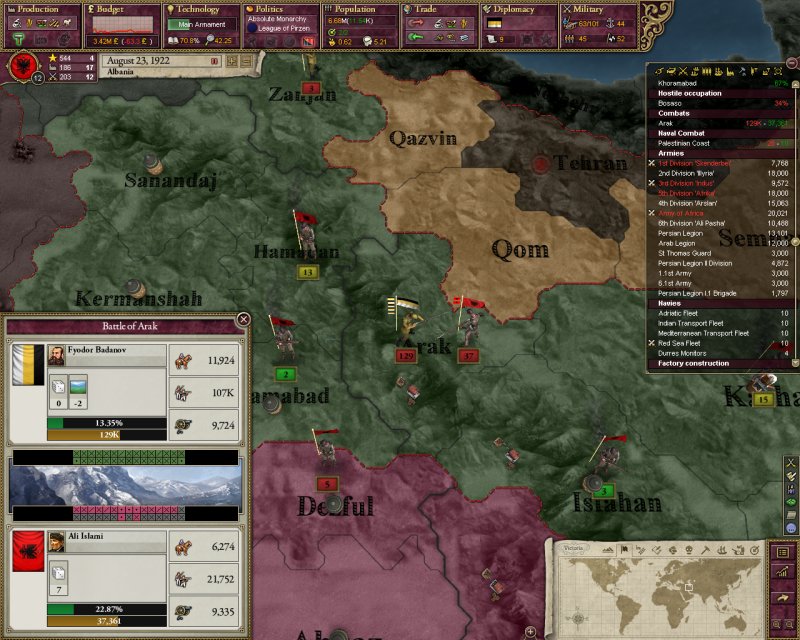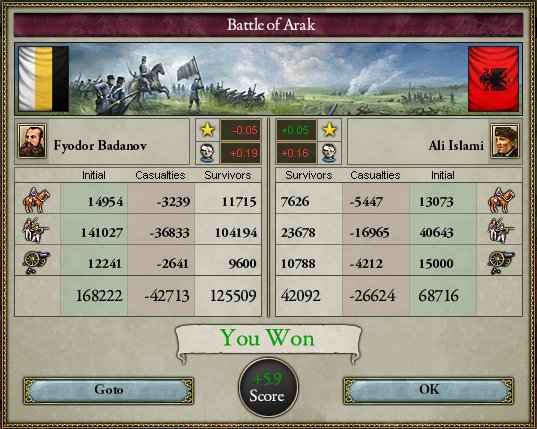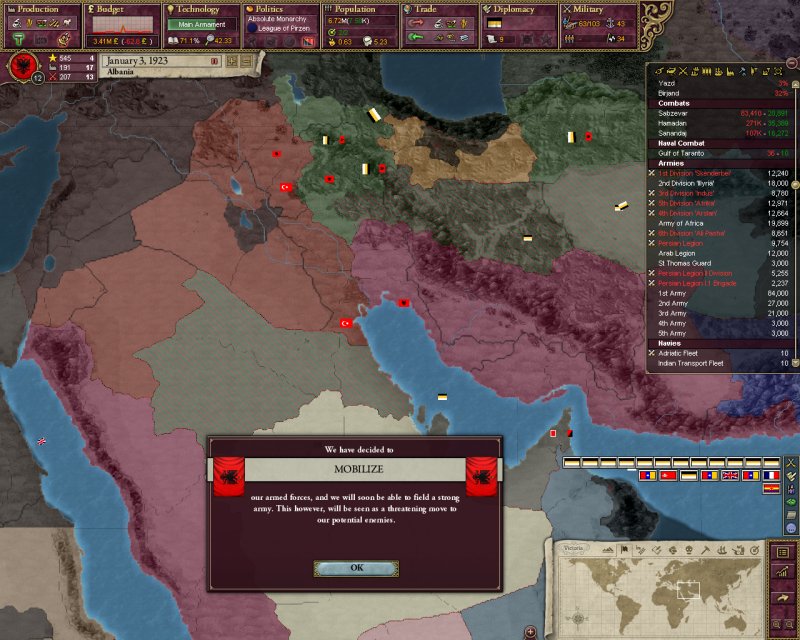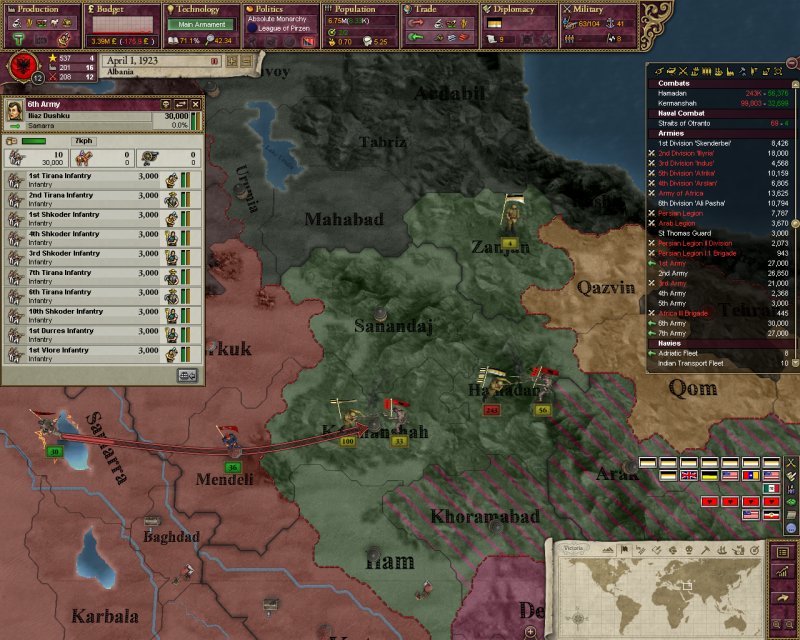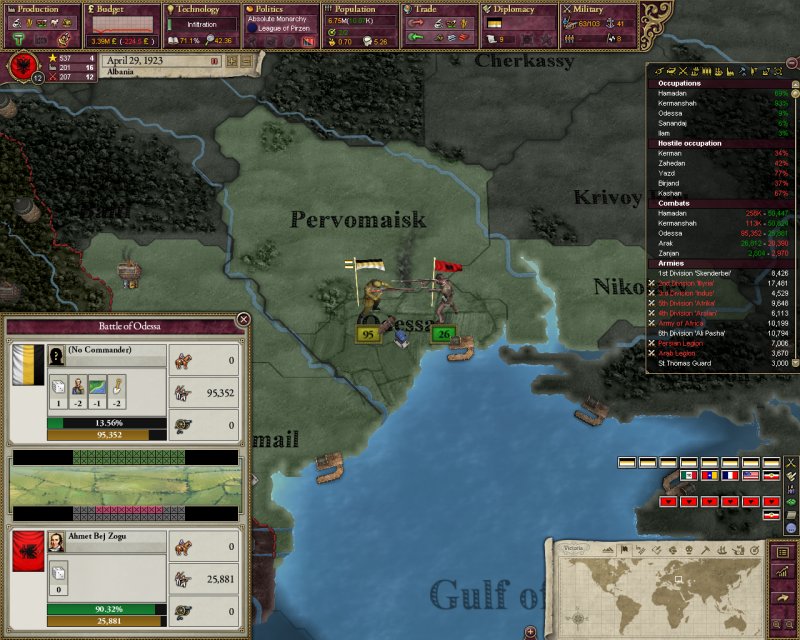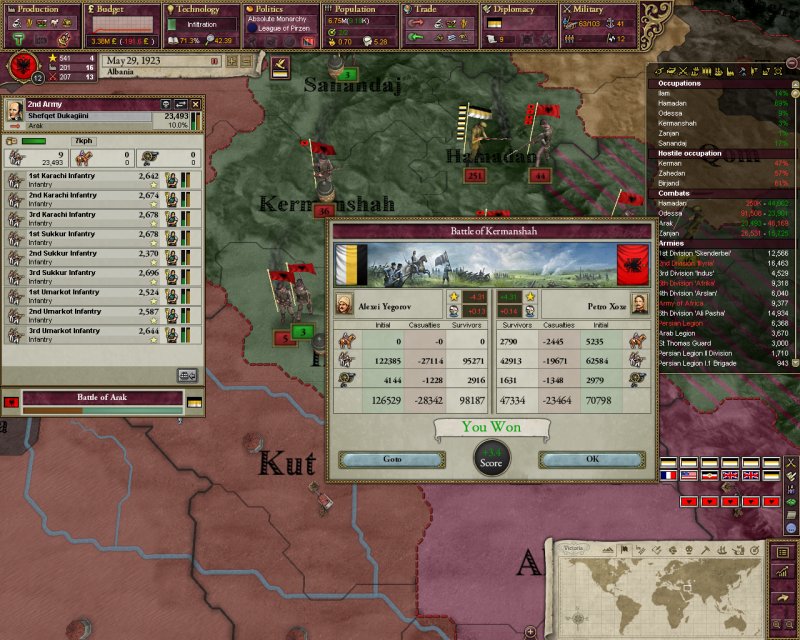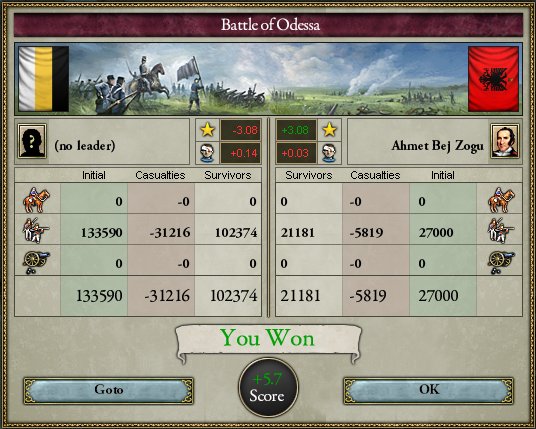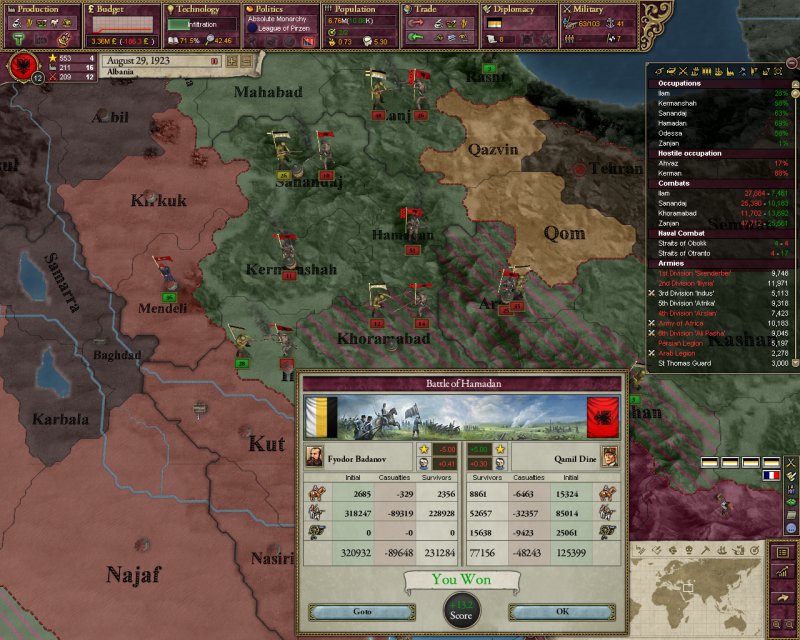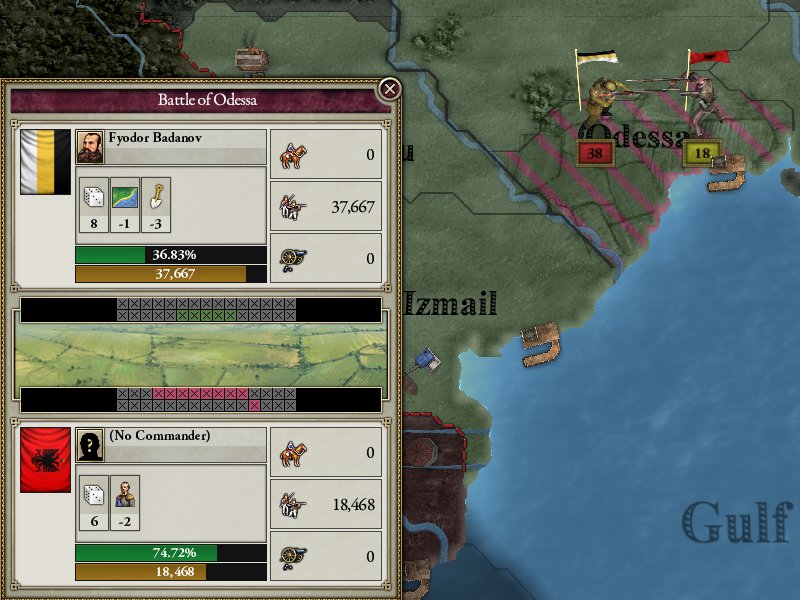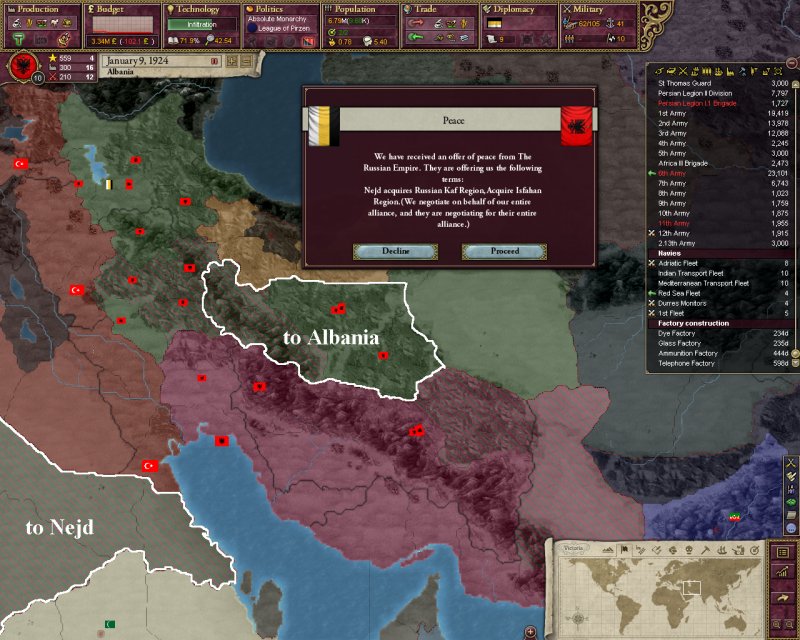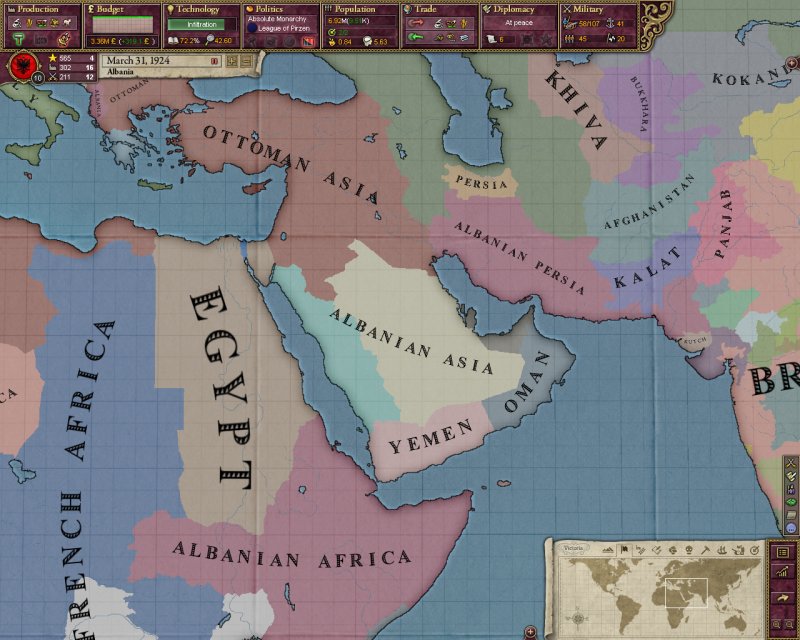Chapter VII
In July of 1910 the Persian government was overthrown by anarcho-liberals. When its truce expired, Russia made no move against it. That only made Albania more nervous.
Certain that Russia was up to something sneaky, and seeing that Persia was by now a failed state, king Skanderbeg II ordered Albanian troops into Persia again in February 1911. The occupation was uncontested, and in September of that year Albanian Persia stood greatly enlarged.
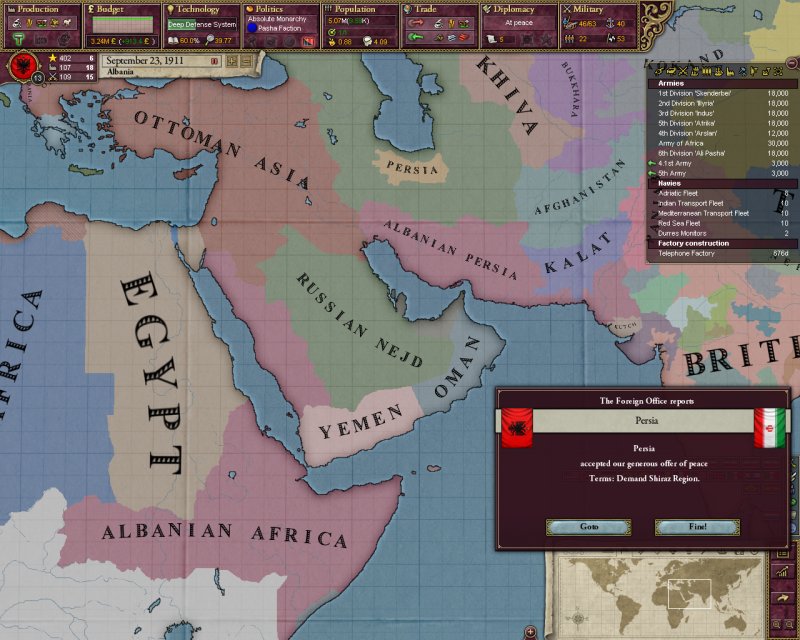
It was hoped that the mountains of central Persia would offer good defensive positions against Russian attacks and also that if Russia were to annex what remained of Persia around Tehran, a new Persia could be created by Albania in the south, as a satellite.
After that action, the king (who was getting rather old and was easily amused by curiosities) agreed to an expedition to colonize the exotic Cocos and Christmas Islands, in the East Indies. They would serve mostly as a prestige colonization, in balance with the Albanian West Indies.
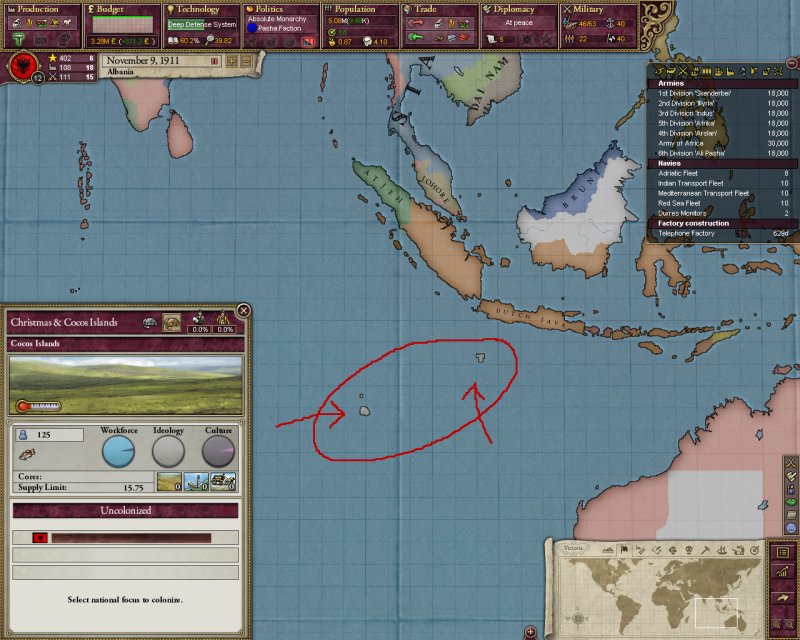
In 1912 a strange thing happened. The conservative Pasha Faction, which had managed the country for many decades, was dissolved leaving no new conservative political formation in its place. In that vacuum, the Radical Party somehow wound up in office, even though anarcho-liberals are anathema to absolute monarchies.
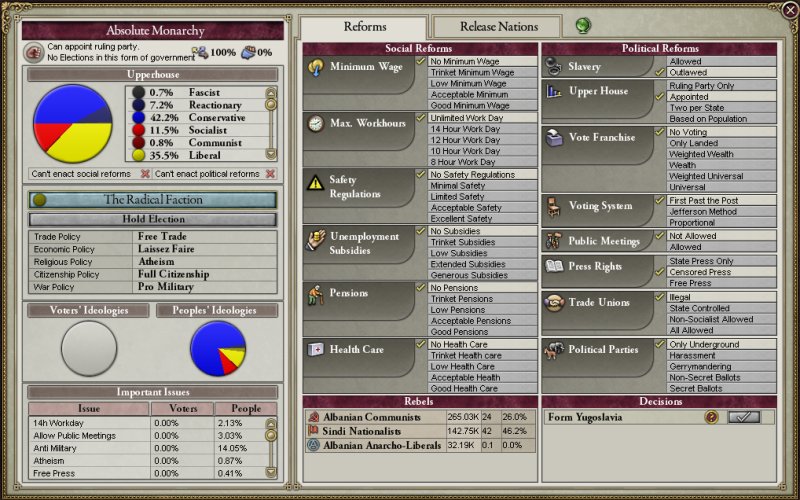
That was soon rectified, with the establishment of the reactionary League of Pirzen as Albania’s new ruling party. The anarcho-liberal politicians were rewarded for their days of service to the state with free lodging in Tirana Prison at the king’s bequest.
Meanwhile, in the big boys’ club, the great powers had paired off in couples. Albania’s protector, Italy, along with Prussia made the weakest couple in industry and prestige but not in military strength, being more formidable than the USA and Colombia. But the latter were on their own continents, so they needed to spend less on defence.
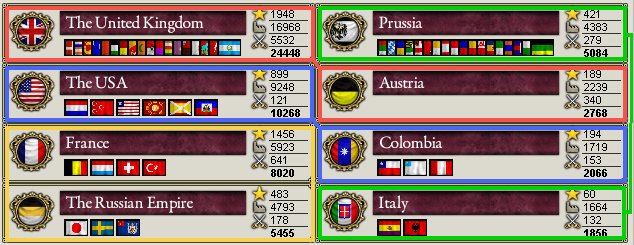
In Arabia and Persia, the battlefield between Albania and Russia, the King gave his blessing for the creation of indigenous armies, which would form the core of the armed forces of their respective nations upon eventual independence – the Arab Legion and the Persian Legion. Starting at just 2 brigades each in 1912, their ranks were expected to swell in later years.
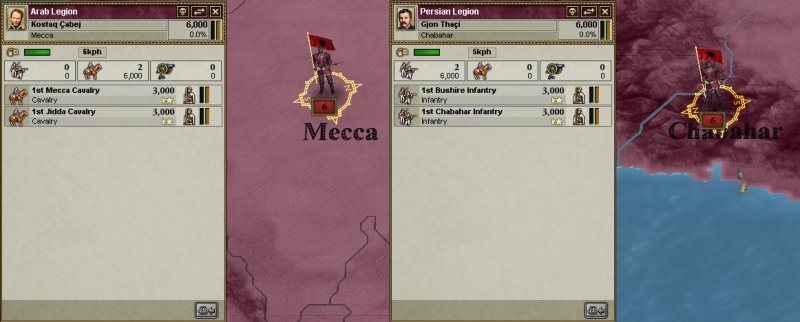
In July of that same year, Prussia formed the North German Federation. Suddenly, the Italian-Prussian alliance no longer seemed so weak…
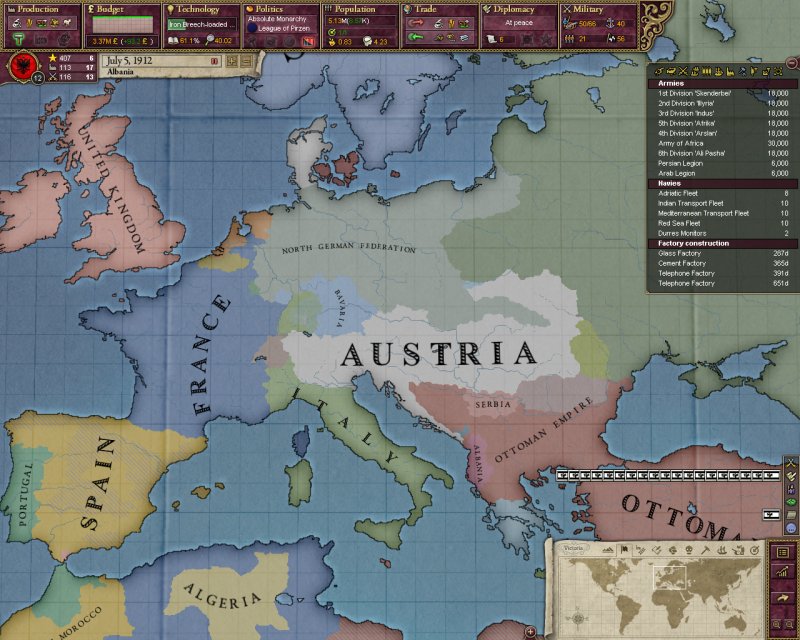
The following year was largely uneventful. In April 1914 bolt action rifles were introduced to Albania, and new uniforms were issued to the troops to go along with them. In May 1914 Russia was shaken by a massive communist revolution. St. Petersburg was, at one point, coming under siege, but it was relieved by the army before the rebels could succeed. Still, much of the empire came under communist rebel control, and it would take years for the Russian army (recently 100-brigade strong) to reassert the Tsar’s authority everywhere.
In August 1914 Spain succumbed to its own communist revolution, dropping out of its alliance with Albania in the process. Fortunately, on that same day the Portuguese ambassador, worried at the developments in Iberia, asked for Albania’s alliance.
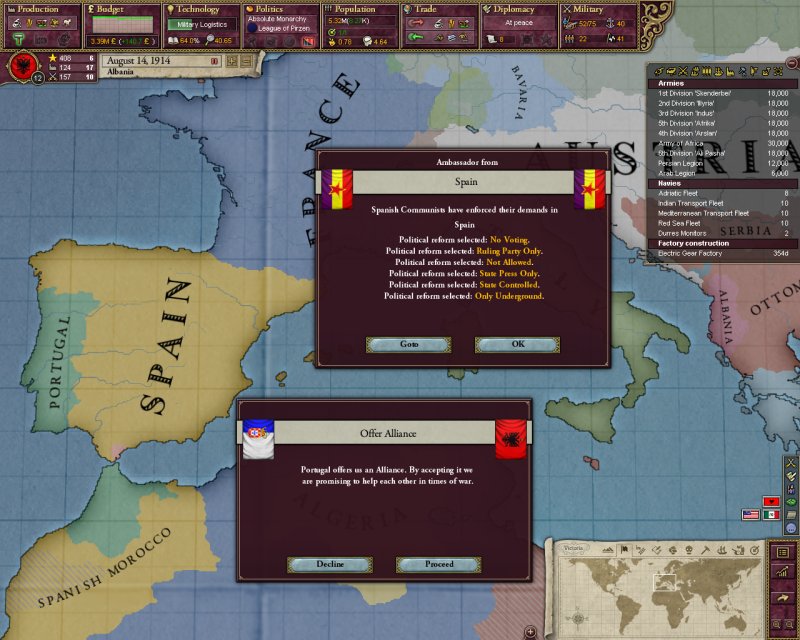
In September 1914 it was noticed that Russian troops stationed in Nejd were wearing new uniforms. It was correctly reasoned that bolt action rifles had come in the same package.
Finally, in February 1918, the old king decided to take a gamble. Russia’s southern states were still occupied by rebels and the Albanian standing army was more than half as big as the Russian one (down to 95 brigades by then) – good odds for a provincial conflict where Albanians hoped to mostly defend. The only risk was that Russia would call its allies, and in particular France, in which case an appeal to French humanism could secure a quick white peace for a decent drop in prestige. But Albania would not call its own allies and Russia would appear weak if it did so unilaterally. In any case, war was declared on Russia to liberate Nedj on February 28, 1916. The die was cast.
As it turned out, not only did Russia not call the nations in its sphere of influence (i.e. Sweden and Japan) but France broke its alliance, rather than come to Russia’s aid. It was an auspicious start, and without Italy as alliance leader Albania could hope to make real gains in Arabia.
The Persian Legion, strengthened to 7 brigades by the start of the war, led the attack on the north-west.
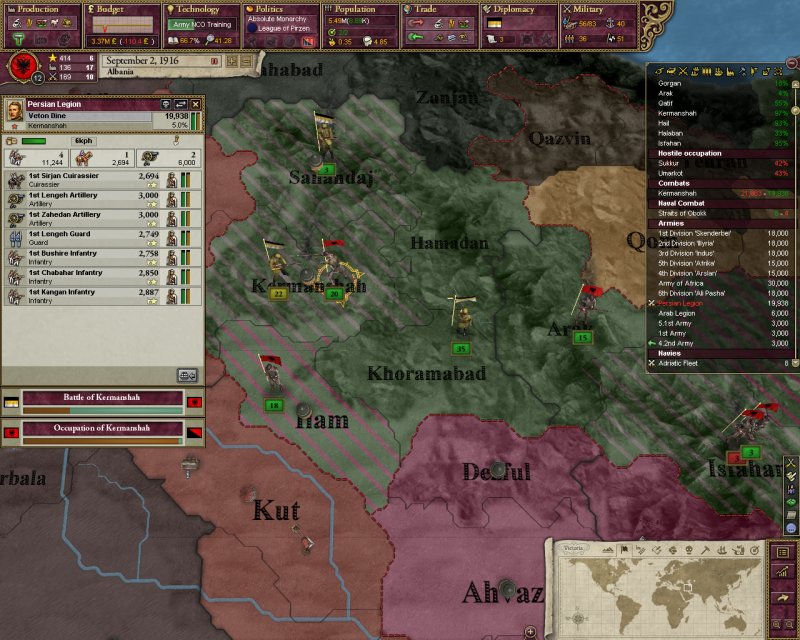
Many Russian brigades, scattered to besiege rebel strongholds across the land, were destroyed in detail as larger Russian armies began to gradually arrive from the north. At the end of the first year of the war, Albanian armies had achieved total success in the north-west, had occupied territory in the north-east, were in control of most of Russian Nejd and were engaging the Russians in the center, along the Zagros mountain chain.
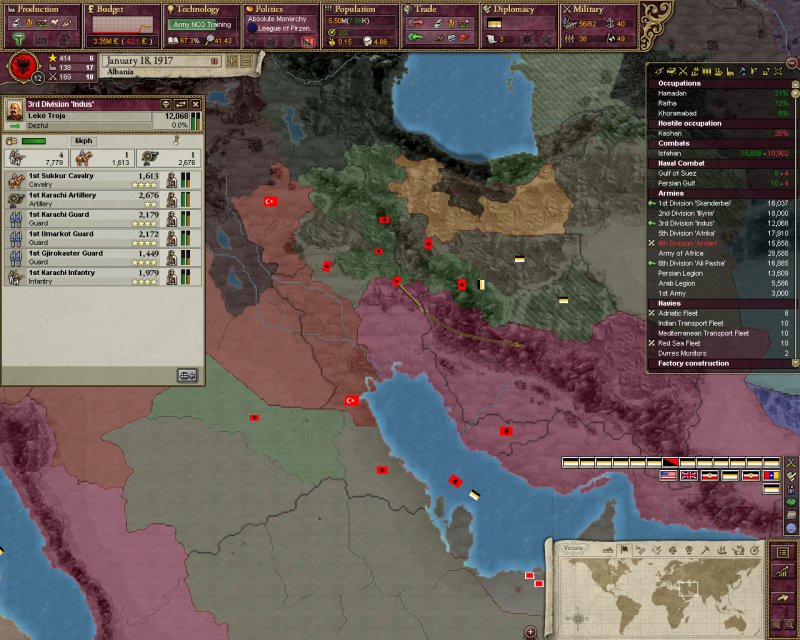
The operations had been made complicated by a small communist revolution, centered in Karachi, and the arrival of Russian ships from the east, even as Albanian monitors kept their Black Sea squadrons at bay. At that point there were hopes of adding the rest of Nejd to the wargoals, so the whole country would be liberated and the Russans expelled from the Persian Gulf. However, while the Russians appeared prepared to part with the southern, Riyadh region, they were not prepared to give up the fight. They mobilized their reserves, bringing their brigade count up to over 330, and started to swarm Persia. Albania had its own reserves, almost 40 brigades, but the actions of Russian Far East squadrons made the sea lanes dangerous to travel and Albanian fleets were overstretched. There was little chance of getting enough reinforcements to balance out the Russians, who were pushing back the Albanian divisions with sheer numbers.
Faced with this predicament, there was a change of plans. The previous wargoal was dropped, in favour of annexing Riyadh Region. A fully independent Nejd could prove a liability with Russians bordering it, asserting influence. However, an Albanian satellite would be more reliable, and the rest of its territory could be added to it with a liberation in some later war. The Russians agreed to the new terms, and the war ended on March 8, 1917, a year and ten days after its start.
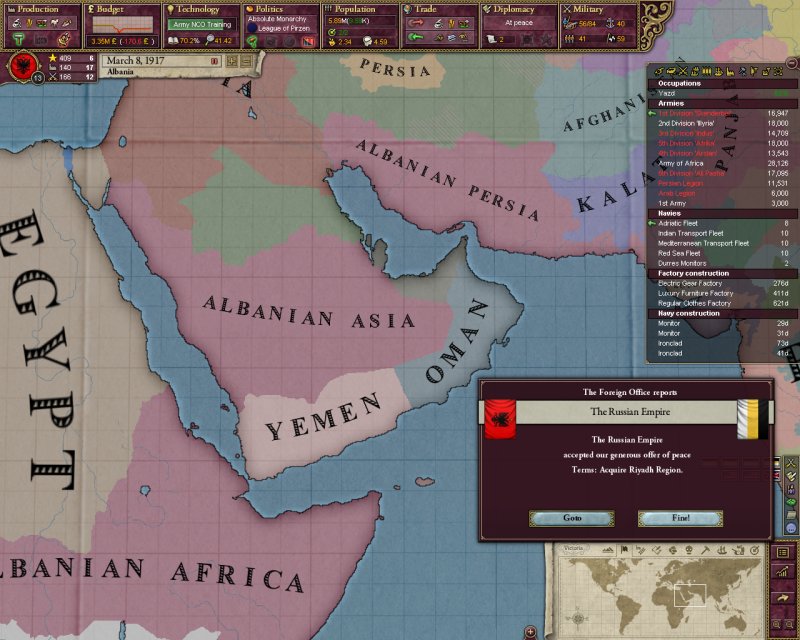
Riyadh region had been turned by the Russians into a state, with about 40,000 craftsmen working in its three factories. The Russians made up 63% of its population but many Bedouins remained, and they could be expected to take over the reins of government, which they did within days.
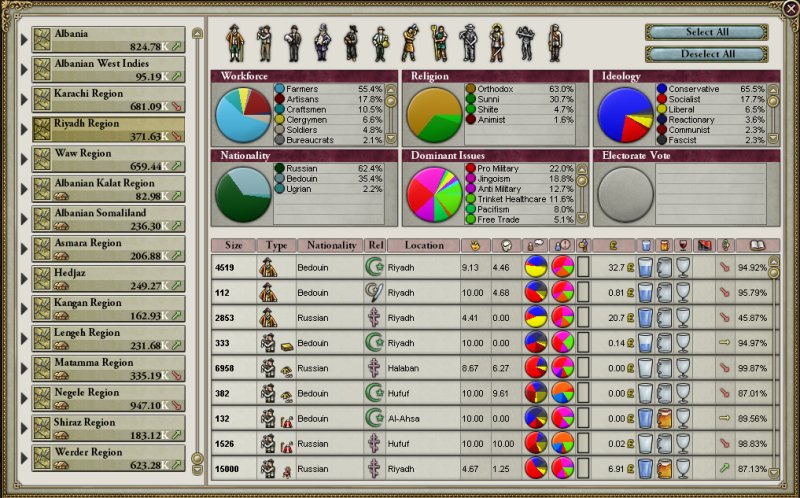
Disappointingly, even though Nejd inherited a solid industrial base and the know-how to operate it, the Bedouins preferred to return to their tents and their old ways, and saw to it that even the Russians couldn’t find work in the factories. They were all demolished in a quite uncivilized manner.
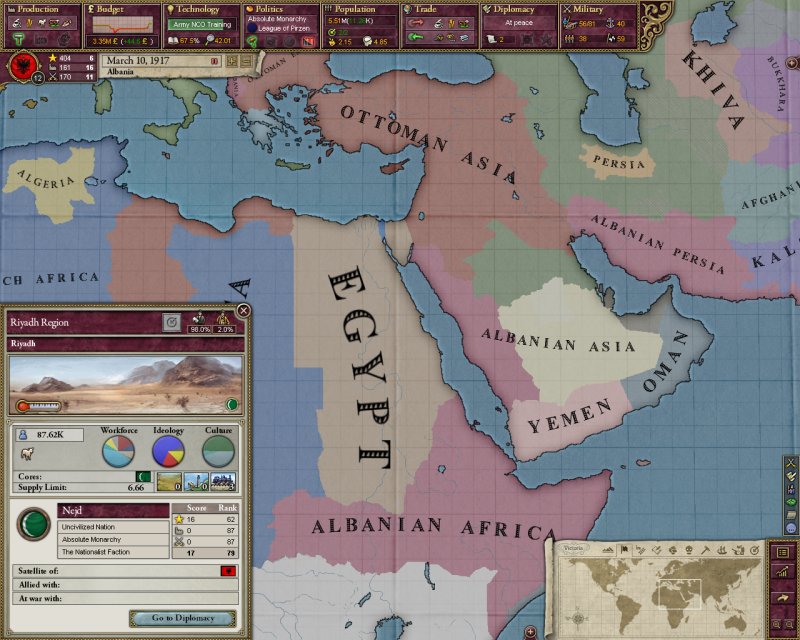
As for Albania, the failure to attain a wargoal not only added unnecessary infamy but also militancy among the population. It was said that there was enough support even for political reform! Of course, the king would have none of that, even though he was no longer in the best of health and it was said that his mental faculties had been deteriorating recently.
There were bread riots in June 1917, and the government responded with apathy. It would take more than a few protesters to change the system.
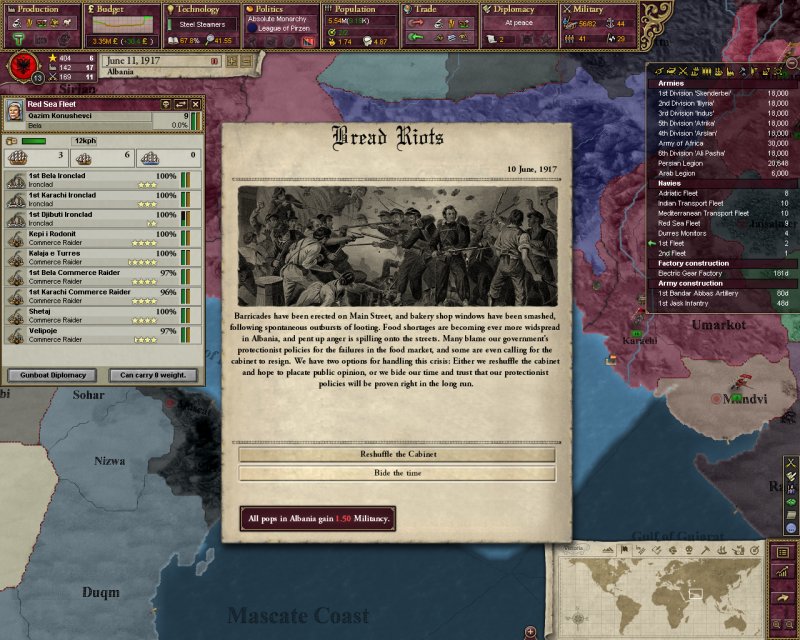
The monarchy would stand absolute.















